Socijalnopedagoška analiza veze percepcije porodičnih odnosa i rizičnog i delinkventnog ponašanja mladih
Social-Pedagogical Analysis of Relation of Perception of Family Relations and Risky and Delinquent Behavior of the Young
Author(s): Izet Pehlić, Jakub Hasić, Nermin TufekčićSubject(s): Social psychology and group interaction, Developmental Psychology, Clinical psychology, Behaviorism, Studies in violence and power, Family and social welfare, Social Norms / Social Control
Published by: Filozofski fakultet, Univerzitet u Zenici
Keywords: family relations; theory of social control; risky behavior; delinquent behavior;
Summary/Abstract: The goal of the research was to investigate perceptions of family relations and risky and delinquent behavior of the young, and to do a social-pedagogical analysis of relation of perception of family relations and risky and delinquent behavior of the young. Methods that were used in the research are: the method of theoretical analysis, and the descriptive analytic survey. The research instruments were: The perception scale of family relations (Macuka, 2004) and the questionnaire of the testimonies of risky and delinquent behavior (Ajduković et al., 2009). The research samples were 205 minors aged 14 to 18, who had issues with delinquent behavior, from the region of Zenica-doboj canton. Generally, the results of the research have shown that there is a statistically negative relation of perception of family relations and risky and delinquent behavior of the minors: that the young who perceive family relations as good enough, in statistically smaller amount do the mentioned risky and delinquent acts. The results of researching relation between emotionality and the delinquent behavior have shown that minors who receive larger amounts of emotionality from their parents have statistically less of the delinquent acts, unwanted normative acts, risky sexual acts, use or abuse of psychoactive substances, violent behavior in close relations, heavy thefts, burglaries, robberies and suicidal and autoagressive behavior. The results of researching psychological control and a form of a risky/delinquent act, have shown that the young who show greater values on the mother control scale show greater values only on the suicidal and autoagressive behavior scale, and that the young who show greater values on the father control scale show greater values on more different scales of unwanted normative behavior, such as risky sexual behavior, heavy thefts, burglaries, robberies, but statistically less values on the scale of violent behavior in close relations. It is concluded that programs of social-pedagogical support should be given to parents of minor delinquents, to develop competences for quality parenting and maintaining healthy emotional relations and psychological control in relationship with the young.
Journal: Zbornik radova Filozofskog fakulteta
- Issue Year: 2018
- Issue No: XVI
- Page Range: 183-198
- Page Count: 16
- Language: Bosnian

